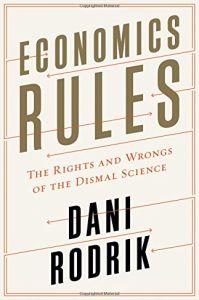Join getAbstract to access the summary!

Join getAbstract to access the summary!
Dani Rodrik
Economics Rules
The Rights and Wrongs of the Dismal Science
W.W. Norton, 2015
What's inside?
When can you trust economists to be right or wrong? And how do you know?
Recommendation
Economist Dani Rodrik critiques the discipline of economics as a social science, acknowledging its occasional successes but also panning its many failures. He includes historical context, theory and clear explanations of how economists tackle real-world problems, and he manages to do all this without littering the text with mathematical equations or Greek letters intelligible only to specialists. Rodrik’s argument, which is quite accessible to the noneconomist, is educational and almost entertaining. getAbstract believes students, teachers and mentors dealing with economics and fiscal policy will appreciate such a rare feat in a book about the dismal science.
Summary
About the Author
Economist Dani Rodrik is a professor of international political economy at Harvard University’s John F. Kennedy School of Government and the author of The Globalization Paradox.





















Comment on this summary